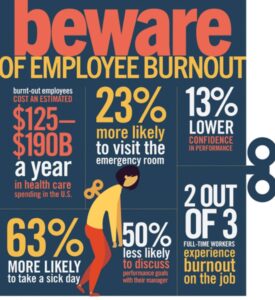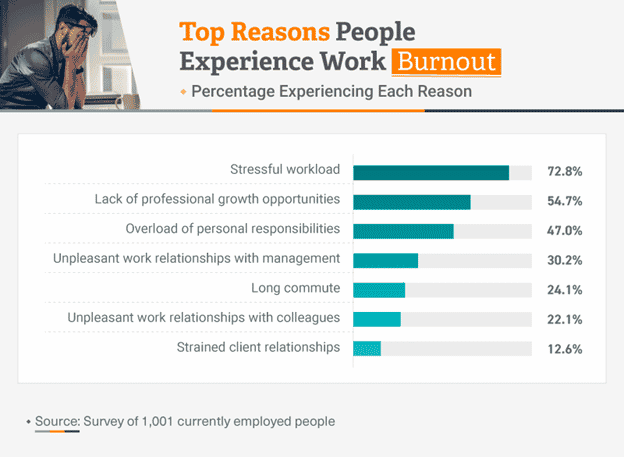We’ve been through a lot lately. The past two years has left many in a slump of sorts. People who worked with spunk and energy before are now simply going through the motions. It’s not that they are lazy or bored with their work, but they are just flat-out exhausted. The pandemic, political confusion, wars, rumors of wars, and a plethora of conspiracy theories are weighing people down.
You can probably relate to this as you notice your team might be experiencing the “dragging butt syndrome.” It’s not their fault though. The human mind and body can only take so much. There has to be some relief and if team members don’t get it soon, they may break. They may look for alternative sources to find comfort, rest, and relaxation. They need a leader who will guide them to better ways and better days.
Why Are Employees Exhausted?
There are two types of exhaustion employees can experience. One is physical, where the work is so physically demanding that the employee is too exhausted to continue. But the kind we are facing today is the second type: emotional exhaustion. A recent study found that emotional exhaustion results in a reduced level of job satisfaction, job performance, and commitment. The result effect is an increased level of turnover.
In the hospitality industry, exhaustion can be caused by emotional labor. Emotional labor is the effort required to manage one’s emotions. It is particularly prevalent when interacting with other people as a requirement of doing the job. Employees working a busy shift or dealing with a rude or demanding guest is emotional labor. During a busy shift, a rude, demanding guest can easily send a server over the edge into emotional exhaustion.
How to Recognize Exhaustion
Hospitality business leaders have enough on their plate without having to keep an eye out for exhausted employees. But it today’s battle of trying to attract and retain team members, it is a necessary task. There are many warning signs that an employee is emotionally exhausted. Here are some key points to watch for:
- They look exhausted-Look for obvious signs of exhaustion such as a lack of motivation and frequent callouts.
- Impatience with co-workers and customers-If your normally easy-going team member has become unfriendly, you may want to meet with that employee. Explore what issues may be affecting them personally or professionally.
- Increased mistakes-The normally detailed-oriented employee begins to have accidents or make mistakes is another sign that they may be exhausted.
- They become more sensitive-Look for signs of the employee becoming emotional and pushing back when feedback is provided to them.

Exhaustion to Burnout
The problem with both mental and physical exhaustion is that both can lead to an employee reaching a state of burnout. Exhaustion leading to burnout is one of the reasons that led to the Great Resignation. The term burnout has been loosely used so often as to become defined as someone who has had enough. But it is a serious condition affecting both lives and businesses. The World Health Organization (WHO) has deemed it serious enough to include it in its list of “International Classification of Diseases.”
According to WHO, “burn-out is a syndrome conceptualized as resulting from chronic workplace stress that has not been successfully managed.” It is characterized by three dimensions:
- Feelings of energy depletion or exhaustion
- Increased mental distance from one’s job, or feelings of negativism or cynicism related to one’s job
- Reduced professional efficacy

Steps to Take
Everyone gets exhausted from time to time, but when exhaustion lingers and affects performance, trouble is on the horizon. But there are steps that can be taken to help deal with team members experiencing mental exhaustion. Incorporating any of the seven following tips is a great first step:
- Make it a priority-A focus on alleviating exhaustion in your team member helps your bottom line. For example, the success of hotels largely depends on employees who offer top-quality service to their guests. Although skilled attentive employees are important to succeed, they are exposed to stress due to the characteristics of their jobs. Unpredictable shifts, the 24/7 nature of work, and long working hours, builds up high levels of stress among employees.
- Create a career plan-A recent study found that many hospitality employees are uncertain about the value of their jobs. Additionally, most front-line employees are young. More than half of them are under the age of 28, and have not yet developed a clear career plan. Thus, more career planning should be provided to help front-line employees gain thorough insights into the hotel business and find their own career paths.
- Training-Training employees improves the service climate and sparks energy. Service climate is another variable that affects role stress, burnout and turnover. Hospitality businesses can improve the organizational service climate through communication, incentive schemes, service quality and responsibility plans.
- Open communication-According to a recent Harvard Business Review article, there are many ways to energize people. These include sharing success stories, setting up competitions, dividing long projects into sprints, and communicating.
- Create a positive and open workplace-Team members who feel that their manager has a willingness to listen will be more likely share their feelings. If the supervisor has empathy, the employee will feel more comfortable opening up.
- Regular check-ins-The business leader should check in with employees on a regular basis. This does two things: it allows the employee to share their feelings. It also gives the employee comfort and confidence knowing that someone cares.
- Enforce breaks-Make an effort to ensure everyone takes breaks and more frequently than in the past. A quick five or ten minutes to sit down away from the work is extremely helpful. Small breaks can go a long way to improving energy levels and emotional outlook.
Alleviating Exhaustion
Emotional exhaustion and burnout is a way of life in the hospitality industry. Completely alleviating exhaustion is not realistic, but the efforts toward that end are helpful. No, you can’t completely eradicate exhaustion. The important thing is to keep monitoring the morale of your team by reassessing and reestablishing burnout prevention and management. Once you know how to recognize it, you can manage burnout and keep it from affecting your company’s bottom line.

